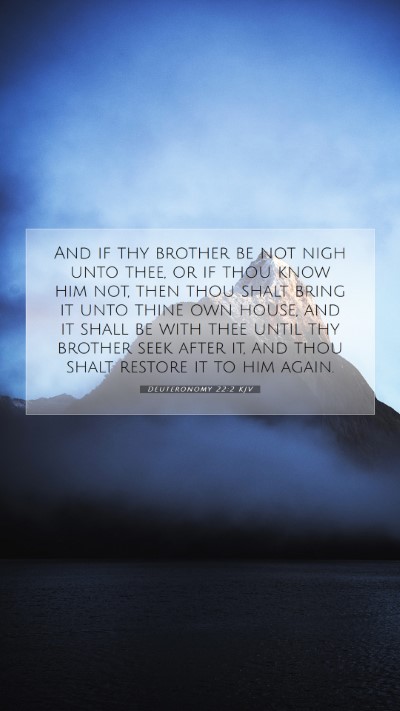Understanding Deuteronomy 22:2
Deuteronomy 22:2 states, “And if your brother is not near you, or if you do not know him, then you shall bring it home to your house, and it shall remain with you until your brother seeks it; then you shall restore it to him.” This scripture highlights principles of responsibility, community relations, and integrity in handling lost property.
Bible Verse Meanings
This verse calls for ethical behavior among the community, particularly regarding lost items. The underlying message emphasizes:
- Responsibility: The verse implies a moral obligation to care for what is not yours.
- Community Support: The mention of a "brother" suggests an inherent understanding of connection and support within the community.
- Integrity: Holding onto a lost item until it can be returned speaks to the importance of honesty and ethical treatment of others’ property.
Bible Verse Interpretations
Matthew Henry states that this verse teaches the importance of restoring lost items to their rightful owners, advocating for a spirit of brotherhood and community. Albert Barnes reflects on the implications of neighborly love underlying the law, promoting a sense of responsibility to assist others.
Adam Clarke further situates this verse in the broader context of the Israelites' community laws, highlighting the moral teachings that offer practical guidance on daily interactions.
Bible Verse Understanding
Understanding Deuteronomy 22:2 involves acknowledging its historical context. It was a law meant to cultivate integrity and mutual respect among the tribes of Israel. The care towards lost items speaks volumes about one’s duty toward fellow community members.
Bible Verse Explanations
The practical instruction provided addresses not just the act of returning lost property, but also builds a foundation for social ethics in society. One could argue that following this command leads to the promotion of trust and healthy relationships among individuals.
Bible Verse Commentary
According to public domain commentaries:
- Matthew Henry: He emphasizes the idea of community support and moral obligation; an individual’s act of returning lost items can enhance collective trust.
- Albert Barnes: He highlights the law as a manifestation of love for one's neighbor, encouraging believers to act in a way that showcases genuine care.
- Adam Clarke: Clarke discusses the moral implications of these laws in everyday life, representing God’s concern for societal justice and interpersonal integrity.
Scripture Analysis
In-depth analysis of this verse reveals its relevance not only in ancient Israelite society but also in modern contexts. It challenges individuals to reflect on their responsibilities towards others, nurturing a culture where possessions are respected, and relationships flourish.
Biblical Exegesis
Exegesis of Deuteronomy 22:2 suggests that God commands His people to act with honorable intentions, considering the rights of others. By upholding such principles, communities can thrive in harmony and justice.
Bible Study Insights
This scripture can serve as a focal point for Bible study groups, as it poses questions for personal reflection and group discussion:
- How does this verse apply to our daily lives?
- What can we learn about integrity from this command?
- In what ways can we foster a sense of community similar to what is encouraged in this verse?
Related Bible Cross References
- Exodus 23:4-5: Discusses the notion of returning lost property.
- Luke 10:25-37: The parable of the Good Samaritan exemplifies neighborly conduct.
- Philippians 2:4: Encourages looking out for the interests of others.
Application of This Verse in Daily Life
Applying the principles found in Deuteronomy 22:2 encourages individuals to be responsible and caring in their communities. This can translate into actions such as:
- Returning lost items to their owners.
- Being considerate about others' property.
- Encouraging a supportive community atmosphere through acts of kindness.
Conclusion
Deuteronomy 22:2 serves as a timeless reminder of our responsibilities toward each other. Through understanding and interpreting this Bible verse, we can foster stronger relationships and promote integrity within our communities, making it relevant for personal growth and societal well-being.


